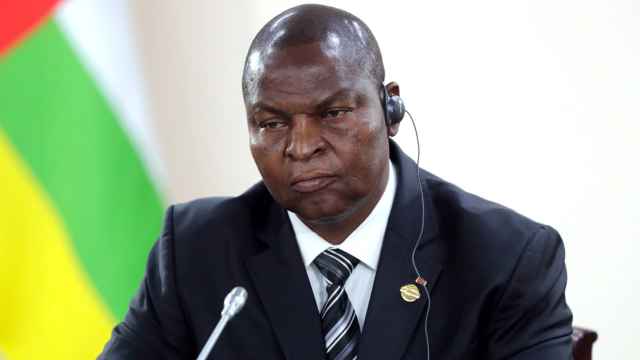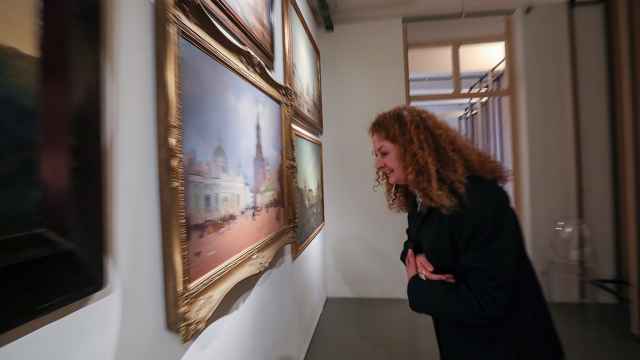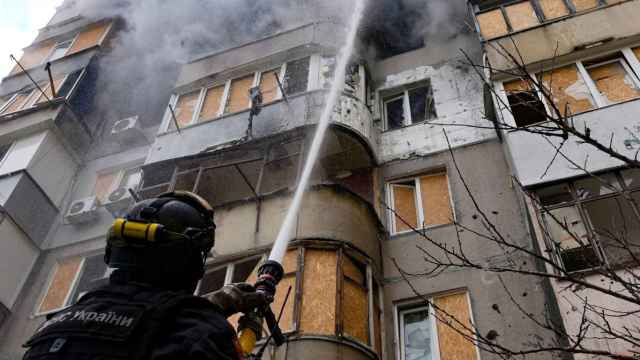Travelers driving to Sheremetyevo Airport dread the short stretch just beyond the Moscow Ring Road near the sprawling Mega shopping mall.
"Things are getting worse and worse," said Georgy Idrisov, who regularly flies as part of his research work on national economic development. "I spent 1 1/2 hours driving these couple of kilometers last month."
One of the reasons for the growing traffic — in addition to shoppers — may be the swelling numbers of airline passengers as the economy rebounds.
Predicting further expansion of the airline business, the government announced recently that it would finally invest an estimated hundreds of millions of dollars in building another runway at the state-owned airport in the next few years.
The resurrected runway plan, which sank into oblivion as the economy slumped worldwide, signals that the federal coffers are ready to open wider for spending on transportation in an attempt to facilitate further economic growth.
"Airports are in the worst situation," said Vadim Dubovik, a Deloitte infrastructure expert in Moscow. "This very much inhibits traffic between regions."
In the next five to seven years, the government needs to invest more than it has done since the Soviet collapse to upgrade the airports of the world's largest country, he added.
There is reason to hurry. Sheremetyevo and the two other airports around Moscow — Domodedovo and Vnukovo — handled more passengers last year than they did in the previously best year 2008, said industry researcher Oleg Panteleyev. The rapid buildup in passenger traffic means that the new, third Sheremetyevo runway has to be operational in 2015, he said.
If the government wants to support airlines and its own ambitions to position Moscow as a global financial center, it has to spend its own money — rather than attract private capital — to finance the new runway because by law runways have to remain state property.
Prime Minister Vladimir Putin warned that the airports would soon approach their cumulative capacity of 65 million passengers a year. They need to be able to handle a combined 100 million passengers by 2020 — double what they served last year, he said.
Most transportation and infrastructure projects were put on ice during the crisis, as the government rerouted funds toward bailing out banks and other measures to stave off a full-blown social and economic collapse.
Runway to Subway
The federal government is buying 75 percent of Vnukovo Airport from the Moscow city government for at least 45 billion rubles, or $1.5 billion, as part of a strategy to ensure better coordination of airport development.
New Mayor Sergei Sobyanin is counting on the money in order to put his subway expansion plans on a fast track. The busy subway is bursting at the seams, carrying significantly more people than it was designed for.
Sobyanin wants 53 kilometers of new lines by 2015, or almost as much as the city has built since the Soviet collapse in 1991 — the time when the capital's population began to swell as mobility restrictions eased.
This year alone, City Hall is spending 56 billion rubles on the work — a more than twofold increase from last year.
Famed for its palatial stations decked out with mosaics and chandeliers, the subway will lose much of its architectural luster with the new stations, which will have a standardized design.
City officials hope the subway expansion will alleviate the congestion above ground that has become damaging to businesses.
"I have to use the subway in Moscow increasingly more often," Dubovik said. "Otherwise, one appointment may take as long as three to four hours."
Moscow's traffic jams are the longest among the world's 20 biggest cities, a study by International Business Machines found last year. The Kremlin ordered Sobyanin to deal with the problem when appointing him mayor at the end of 2010.
In addition to subway expansion, City Hall plans to spend 126 billion rubles in 2011 on road construction.
Mandatory Roads
More testimony of the resolve to make driving a less grueling experience came with the establishment of the Federal Road Fund this year. Under a law that President Dmitry Medvedev signed in April, the government can't re-allocate the fund's money for purposes other than road construction.
The fund will draw 254 billion rubles, or $9 billion, from the 2011 federal budget. An additional 80 billion rubles, according to Transportation Minister Igor Levitin, will come from a new gasoline tax that came into force this year.
But the overall federal spending on roads this year will be even higher — up to 453.4 billion rubles — if the government fulfills several ancillary programs. Should that happen, road spending will set a new record in Russia.
According to the government, it spent 186.3 billion rubles on roads last year.
Idrisov, an infrastructure expert at the Gaidar Institute for Economic Policy, attributed the planned massive expenditures across the country to the State Duma and presidential elections coming up in December and March, respectively.
"It's more about politics than the economy," he said.
If it happens in the intended proportions, the spending would also benefit Siberia and other eastern regions, where the absence of roads cuts off at least 30,000 settlements from the rest of the country.
Inadequate roads in the regions are a restraint to private businesses, including those helped by the International Financial Corporation, the World Bank's private-sector lending arm. As companies grow, they need a link to the bigger market of the rest of the country or abroad, said Snezana Stoiljkovic, IFC director for Eastern Europe and Central Asia.
"Let's take agribusiness as an example," she said. "If you really want to have this sector as a priority you don't only need to produce things, but you also need to store them, transport them and export them."
Russia expects to reclaim its place as one of the world's leading grain exporters once it recovers from the drought that scorched harvests last year.
Private Money
Stoiljkovic said the best way for the government to improve the situation would be to join efforts with private capital through more public-private partnerships — but insufficient legislation hampers this prospect.
Teaming up with private investors would not only bring additional money, but also better technology and financial discipline, said Ernst & Young partner Alexander Yerofeyev.
Private money for such deals would not be hard to come by, according to Deloitte's Dubovik.
"Investors and banks are looking for projects," he said.
As evidence, the IFC and EBRD easily raised 200 million euros ($285 million) from eight foreign commercial banks for an airport expansion in St. Petersburg last year. The transaction was heavily oversubscribed, the European Bank of Reconstruction and Development said at the time.
Pulkovo Airport is Russia's first public-private partnership project financed with private money, but the government's development bank Vneshekonombank is also contributing to the overall debt package of about 716 million euros. Northern Capital Gateway, the company that is in charge of the expansion, won a concession from the City of St. Petersburg in 2009 to operate the airport for 30 years. The venture doesn't have to invest in the Pulkovo runway because the government had upgraded it before agreeing to the concession.
International Spotlight as Motive
Nevertheless, the government bears the brunt of spending on transportation — and it had no choice but to continue doing so even as the crisis hit.
The reason: There is no way to postpone the 2014 Sochi Winter Olympics or the annual meeting of the Asia-Pacific Economic Cooperation forum in Vladivostok next year. Russia sought to host the prestigious events, in part, to use preparations as a catalyst for the regional economies.
The federal government and state-owned Russian Railways together are investing at least 342 billion rubles according to the latest estimates, to create comfortable travel conditions for Olympic athletes and spectators. These expenses — a third of the total bill that the government and private investors have to pay to prepare for the games at the Black Sea resort — are contributing a lot to making the event one of the most expensive in Olympic history. The total costs to host the Sochi Olympics are more than triple those that it took to hold the previous Winter Games in Vancouver, Turin and Salt Lake City combined.
In fact, the roads — passing over rivers and through tunnels in the mountains — will also be some of the world's most expensive. The Adler-Krasnaya Polyana combined motor and railway road alone requires 242 billion rubles to build, including a few railway stations on the 50-kilometer route. Spending on the other, 17-kilometer, relief road for Kurortny Prospekt will reach 100 billion rubles.
A major Russian construction company involved in some of the Sochi projects, Mostotrest, was able to successfully sell its shares to international investors in November, raising $388 million. Putin's former judo partner, Arkady Rotenberg, is one of the company's largest shareholders.
In Vladivostok, one of the biggest projects involves building two bridges at a combined cost of 55.4 billion rubles. One of the bridges, across the Eastern Bosporus, will have the world's longest cable-stayed span of 1,104 meters.
Of course, the local Knevichi airport has to get better equipped to provide for increased arrivals — a goal that is costing the federal budget a total of 10.3 billion rubles, according to the federal program of Vladivostok's development.
Russia will have to start spending even more rubles a couple of years later to fulfill its obligations as the venue for the 2018 football World Cup.
As far as airports like Sheremetyevo, some noticeable improvements do not take billions of dollars or international attention to achieve — just better management.
"The service quality is steadily growing to the European level," Idrisov said. "Picking up your baggage has been much faster in the past two years."
A Message from The Moscow Times:
Dear readers,
We are facing unprecedented challenges. Russia's Prosecutor General's Office has designated The Moscow Times as an "undesirable" organization, criminalizing our work and putting our staff at risk of prosecution. This follows our earlier unjust labeling as a "foreign agent."
These actions are direct attempts to silence independent journalism in Russia. The authorities claim our work "discredits the decisions of the Russian leadership." We see things differently: we strive to provide accurate, unbiased reporting on Russia.
We, the journalists of The Moscow Times, refuse to be silenced. But to continue our work, we need your help.
Your support, no matter how small, makes a world of difference. If you can, please support us monthly starting from just $2. It's quick to set up, and every contribution makes a significant impact.
By supporting The Moscow Times, you're defending open, independent journalism in the face of repression. Thank you for standing with us.
Remind me later.





